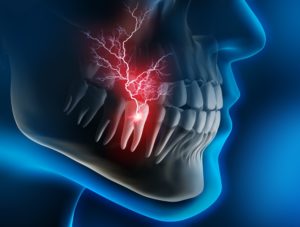 Nothing is worse than a persistent toothache. While you may believe occasional pain is normal, it’s never a good sign. Often, it is a symptom of a potentially serious problem, like an infection deep within the tooth. American Family Physician reports that 22% of adults have experienced oral discomfort within the last 6 months, with toothaches at the top of the list. Depending on the type of pain you’re having, you may need to contact an emergency dentist or risk losing your tooth. Here are 4 of the most common culprits of toothaches.
Nothing is worse than a persistent toothache. While you may believe occasional pain is normal, it’s never a good sign. Often, it is a symptom of a potentially serious problem, like an infection deep within the tooth. American Family Physician reports that 22% of adults have experienced oral discomfort within the last 6 months, with toothaches at the top of the list. Depending on the type of pain you’re having, you may need to contact an emergency dentist or risk losing your tooth. Here are 4 of the most common culprits of toothaches.
1. A Dull Ache
A dulling, ongoing ache is among the most prevalent types of toothaches. Sometimes, an object stuck between the teeth or in the gums can be the cause; however, it can also be a symptom of a more serious problem, like an abscess or untreated bruxism. Contact your dentist and explain the situation for an appointment.
2. Sensitivity
Does a sip of ice water make you pucker your lips? You might have sensitive teeth, which can be caused by worn enamel, tooth decay, or exposed roots. It can also result from failing fillings, fractures, or gum disease. Generally, the discomfort lasts for about 30 seconds. Although it’s only temporary, don’t wait until your next cleaning and checkup to see your dentist to find the source of your discomfort.
3. Sharp Pain
Sharp pain can occur when placing pressure on a specific tooth. A jabbing sensation is often caused by an untreated dental problem, like a fracture, failing restoration, or tooth decay. Without any treatment, your tooth could be at risk of serious damage, like a break or an infection.
4. Severe, Throbbing Pain
Nothing is worse than constant, throbbing oral pain. Unfortunately, this may mean there’s an infection brewing in your mouth. Other signs may include discolored or bleeding gums, bad breath, or a foul taste in the mouth. You’ll need to see an emergency dentist quickly to prevent the infection from spreading or the loss of your tooth.
Managing a Toothache at Home
While you wait to see your dentist, you can do several things at home to manage your discomfort, like:
- Rinse your mouth with salt water to kill bacteria and reduce pain or inflammation.
- Take an OTC pain reliever.
- Apply a cold compress to numb the area temporarily.
- Avoid hot, cold, or acidic foods and drinks.
- Chew on the opposite side of your mouth.
- Avoid hard or sticky food.
- Sleep with your pillow elevated to prevent blood from pooling in your head, which can cause throbbing pain.
Although no one has time for an unplanned trip to their dentist, don’t ignore any dental pain. Contact your dentist for an appointment.
About Dr. JD Hansen
Dr. Hansen earned his dental degree from the University of Louisville and has completed additional education in cosmetic and implant dentistry. He can treat the most complex oral health issues, including dental emergencies. Contact our office today to request an appointment.
